Introduction
Big tech platforms have a significant language moderation problem. There is a massive discrepancy among popular Western apps in moderating content outside the English language, such as Spanish, for example. This gap, along with the increasing influence of far-right politics across Europe, including Spain, has allowed extremist content to spread, sometimes unchecked. On social media, particularly in under-moderated spaces, fringe narratives find fertile ground, often spreading disinformation without explicitly inciting violence.
Climate change denialism thrives in these environments. The unchecked spread of conspiracy theories on social media continues to fuel some far-right extremist ideologies, while platforms like TikTok struggle to implement effective measures to counter them. As a result, harmful narratives, including climate change disinformation and white supremacy, continue to proliferate.
Extremist conspiracy theories pose a considerable risk of radicalisation, especially those that frame the world in terms of in-groups and out-groups, fostering the belief that out-groups are secretly working to manipulate events that affect the in-group. Climate change denialism is a prominent example, with narratives that global institutions, such as the United Nations, the World Economic Forum, or the European Union, fabricate climate change to control the population and consolidate wealth and power. These narratives are rooted in a broader right-wing distrust of ‘elites’ and are often linked to conspiracy theories such as the “New World Order”, the “Great Reset”, and disinformation about the 2030 Agenda for Sustainable Development.
Several studies indicate that white individuals with far-right views are the most sceptical about climate change. Given that right-wing extremism is rooted in racist and conspiratorial beliefs, it is crucial to examine whether and how white supremacist theories like the “Great Replacement”, the “Kalergi Plan”, or “White Genocide” intersect with climate change denial on social media.
This Insight will explain how some Spanish TikTok accounts promoting climate change denial, often framed as part of a secret agenda, are also advancing white supremacist ideologies. Through digital ethnography and content analysis, it will examine the ideological and rhetorical overlaps between these two narratives, both of which, according to TikTok’s Community Guidelines, should be moderated and removed, and analyse how the platform enables their intersection and amplification.
Methodology
The research is based on a sample of 30 TikTok accounts in Spanish identified in mid-March 2025. The accounts were retrieved through a manual search using TikTok’s built-in search bar, by entering the following search terms in Spanish: ‘climate change,’ ‘global warming,’ ‘climate change is a hoax,’ and ‘Agenda 2030. ´ To ensure neutrality in the search process and avoid algorithmic personalisation, the searches were conducted using a newly created TikTok account that had no prior interactions or engagement with any content on the platform.
This method aimed to replicate how most TikTok users interact with the platform, as the content was found through search results returned by the platform’s algorithm. The search focused on accounts that had uploaded climate change denialism or climate disinformation content to determine whether they also promoted white supremacist theories. Each of the 30 accounts in the final sample was manually analysed and categorised based on whether they featured white supremacist material or not. Additionally, it was examined whether the accounts contained any other forms of hate material targeting specific groups, which were classified into three main categories: misogyny, antisemitism, and anti-LGBTIQ content.
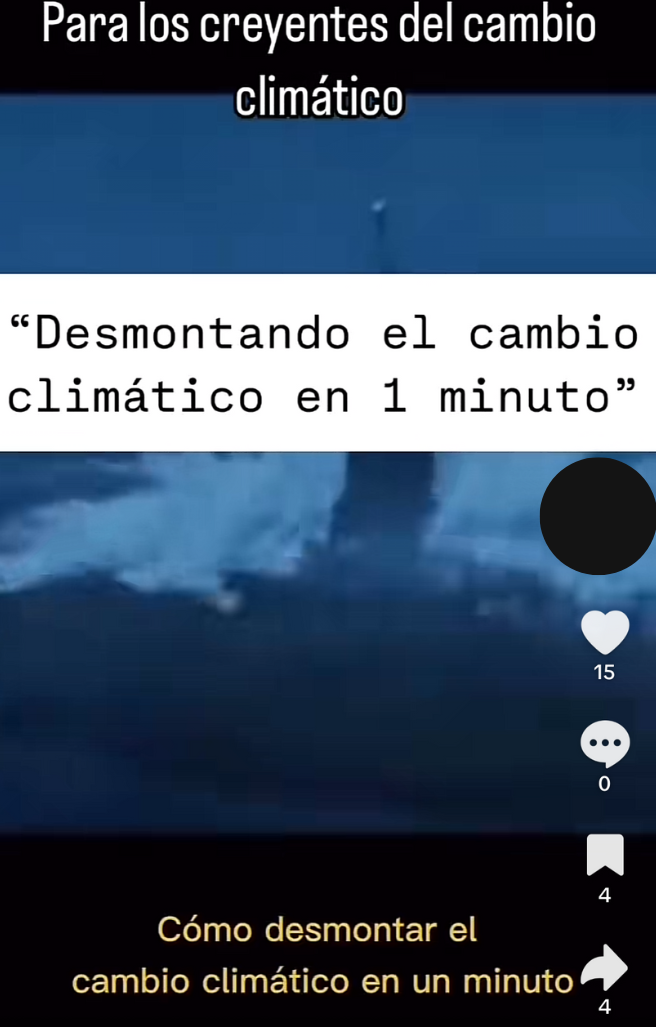
Figure 1: Screenshot of a TikTok video that says: “For the believers in climate change. Debunking climate change in 1 minute”.
Key Findings
The analysis of 30 sample TikTok accounts showed that climate change conspiracy theories indeed do not exist in isolation, but often intersect with extremist and hate-driven ideologies, like white supremacy. 20 accounts (67%) also promoted anti-immigrant theories such as the “Great Replacement” and “Kalergi Plan,” framing both climate and migration policies as threats to national sovereignty and identity, and linking climate scepticism with xenophobia.
The analysis revealed that climate change denial and white supremacist rhetoric on these accounts are interconnected with other forms of hate targeting historically marginalised communities based on immutable and protected attributes. Among the 30 accounts, 19 (63%) openly attacked the LGBTIQ communities, particularly transgender individuals, often pushing a narrative of alleged secretive agendas that prompt gender ideology and undermine white reproductive capacity.
Additionally, 10 accounts (33%) shared misogynistic content, including wishes of sexual violence against women by migrants, blaming them for supporting migration policies. Antisemitic rhetoric appeared in 5 accounts (17%), promoting “the Protocols of the Elders of Zion” conspiracy and framing Jews as orchestrators of secret plots tied to the “Great Replacement” theory and the “Kalergi Plan.”
Lastly, 20 accounts from the sample glorified Spanish fascism and former dictator Francisco Franco. Accounts frequently used nationalist and Francoist imagery, referenced Falange symbolism, and opposed the Law of Democratic Memory that seeks to acknowledge victims of the Franco regime, facilitate historical investigations, and remove Francoist symbols from public spaces.
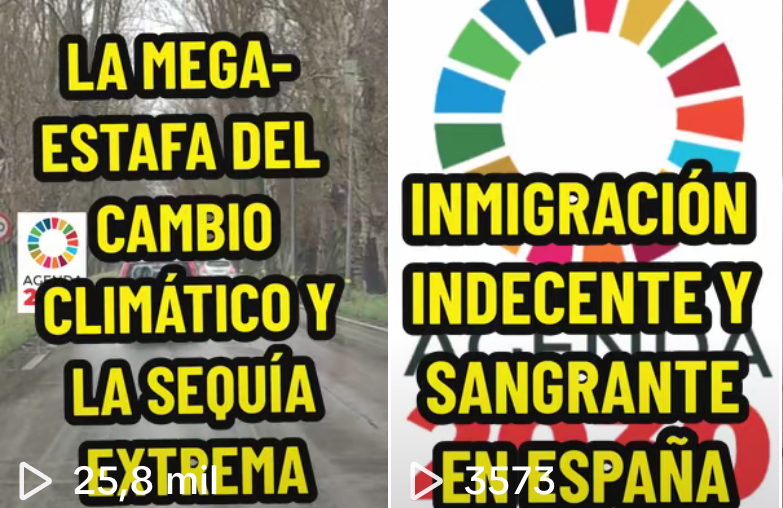
Figure 2: Feed of an account where titles like “The mega-scam of climate change and extreme drought” and “Indecent and bleeding immigration in Spain” coexist, both featuring the Agenda 2030 logo.
Content and Narrative Analysis
“The elites´” secret plan
In the analysed sample, “Agenda 2030” is seen as an umbrella term for conspiracy theories about an elite group orchestrating a globalist world government, rather than as a sustainable development agenda. These theories associate UN Agenda 2030 with conspiracy theories about the “New World Order” and the “Great Reset”, claiming that global elites aim to centralise power, control global markets, and restrict individual freedoms, among other goals. Both climate change and immigration are seen as intrinsic elements of this plot, and the anthropogenic origin of climate change (that humans have caused the Earth’s temperature to rise through fossil fuel burning) is rejected.
The dominant rhetoric suggests the goal is to destroy the Spanish population through mass immigration, replacing native Spaniards with non-white immigrants, particularly from Africa, and by generating climate events using geoengineering, HAARP (High-Frequency Active Auroral Research Program), or chemtrails. The accounts share a common epistemological perspective, positioning themselves as bearers of hidden truth with exclusive knowledge of covert plans related to climate change manipulation and immigration. This narrative is in clear alignment with the concept of “redpilling”, a common thread in far-right extremism. In fact, six accounts had references to truth or consciousness in their usernames.
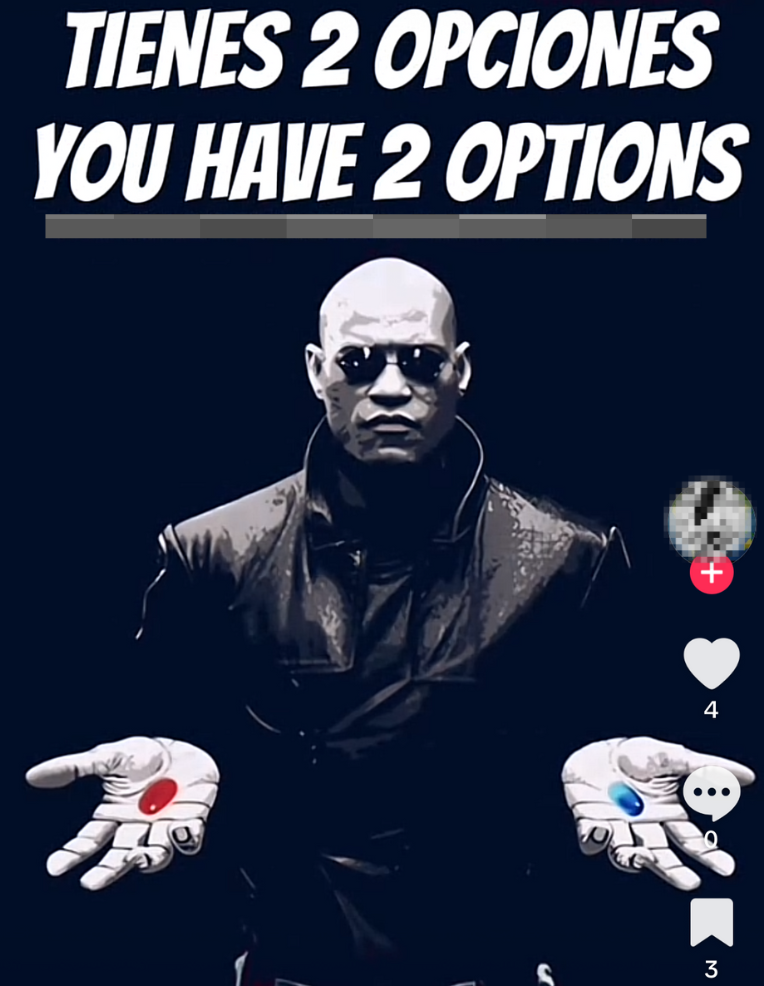
Figure 3: Example of “redpilling” identified in the sample.
Aligned with this mindset, recurring droughts are interpreted as part of a malicious secret plan to deliberately dry out Spain, aiming to destroy its agriculture and cattle industry. Further, users disseminated videos on the alleged replacement of Spanish farmers with mass immigration and forcing Spain to rely on agricultural imports from Morocco, a country frequently blamed for the ‘replacement’ of the white population.
The October 2024 floods in Spain, which caused over 200 deaths and extensive infrastructure damage, generated significant disinformation around climate change. While many scientists link the floods to climate change, users in the sample claim they were caused by the Spanish government’s destruction of reservoirs and dams, an idea widely debunked, or by chemtrails. A particularly concerning narrative suggests that it was caused by Morocco using advanced technology to manipulate the weather. From this xenophobic perspective, Moroccan migrants are framed as an internal enemy, a Trojan horse undermining Spain. Many allege a secret pact between the Spanish government and Morocco to destroy Spanish society.
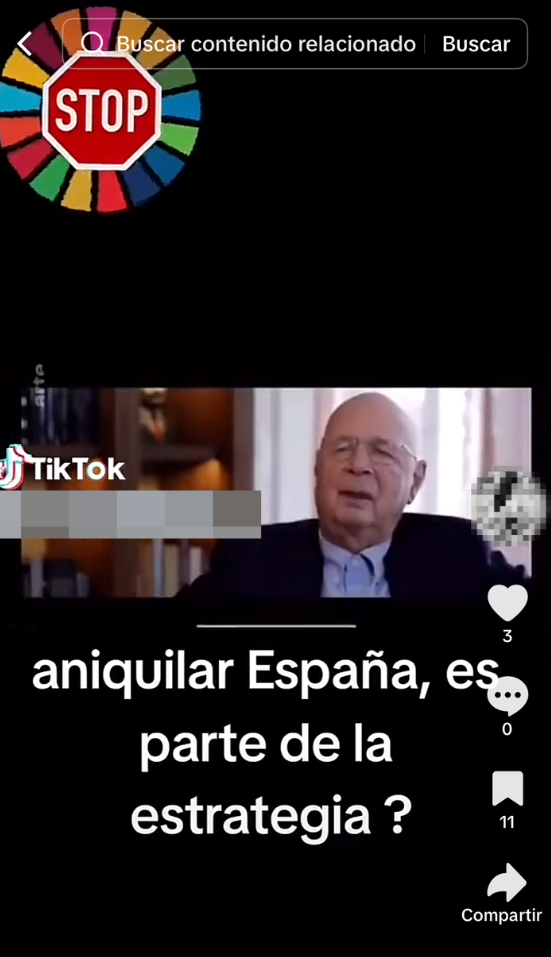
Figure 4: Video showing a manipulated interview with Klaus Schwab, President of the World Economic Forum, suggesting that he claims annihilating and destroying Spain is part of a hidden agenda.
Additionally, the growing internal polarisation, especially around Catalan independence, is fueling Islamophobic and anti-immigrant hatred. Those who see themselves as “true Spaniards” direct their hostility toward Catalans both for their demands for independence and for the region’s high immigrant population. Content was found that partially blames Catalans for the 2017 terrorist attacks in Barcelona and Cambrils, arguing that their permissiveness toward immigration was a contributing factor. A troubling trend features images of a future Catalonia dominated by Muslims, even calling it the “Islamic Republic of Catalonia.”
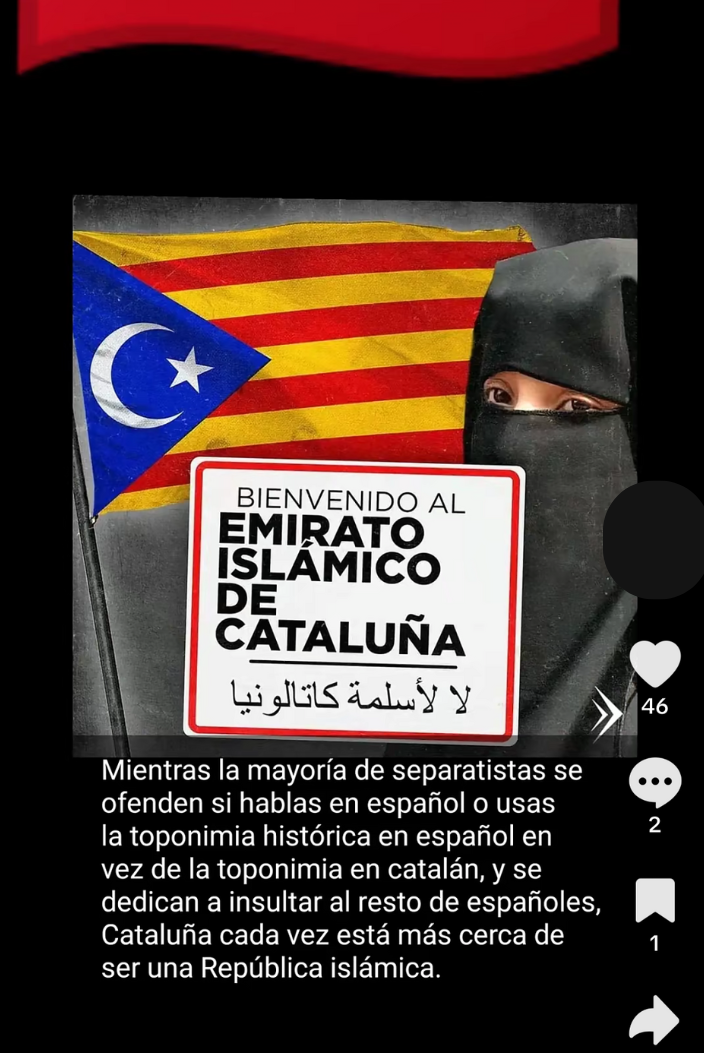
Figure 5: Post that says: “Welcome to the Islamic Emirate of Catalonia. While most separatists get offended if you speak Spanish or use historical place names in Spanish instead of Catalan, and they insult the rest of the Spaniards, Catalonia is increasingly close to becoming an Islamic Republic.”
Depopulation and control
In clear alignment with the Great Replacement conspiracy theory, users sampled argue that the UN’s focus on sustainability is actually part of a deliberate global effort to reduce the white population. The “depopulation” of white people is seen as a preliminary step towards the “replacement” by immigrants. From this perspective, climate change, viewed as artificially produced, is seen as a tool, along with the promotion of women’s reproductive rights, LGBTIQ rights, and environmental sustainability. According to this narrative, users see these as essential to push for ‘depopulation,’ which they believe disproportionately affects white people.
On the other hand, environmental policies are interpreted as a tool for control, fitting into a continuum of conspiratorial ideas that range from vaccine microchips to 5G technology. Users argue that elites aim to deprive white people of their cars, prohibit meat consumption, destroy their wealth through environmental taxes, and establish total surveillance, with the “15-minute cities” conspiracy theory frequently cited as an example.
This narrative of control and lost privileges claims that white people will face misery while migrants become dominant and privileged. A key trend features AI-generated images of black people enjoying luxury in Spain while Spaniards live in poverty. To spread these ideas, rhetoric about Spain’s Islamisation fuels fears, particularly about its impact on Spanish women. Fake news about crimes allegedly committed by Muslims is widely shared to reinforce this belief. Additionally, a trend portrays past photos of Spain as idyllic, contrasting them with the supposed destruction caused by both artificially induced climate events and mass immigration, highlighting the decline of a peaceful era when the population was predominantly white and unaffected by manipulated climate events.
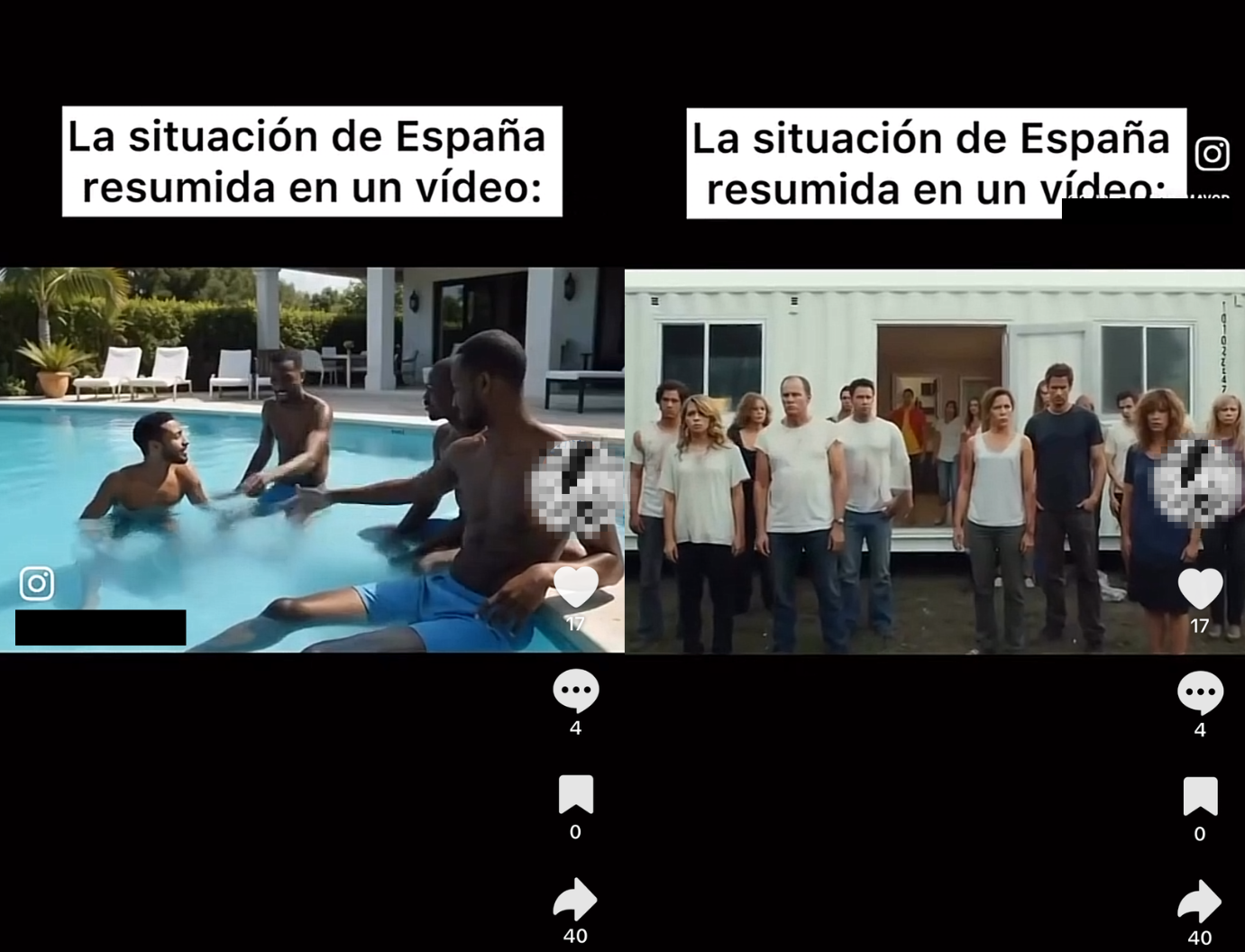
Figure 6: Clips from the same video that says: ‘The situation in Spain summarised in a video, showing Black people enjoying luxury and white people living in poverty.
Algorithmic Amplification
TikTok is one of the signatories of the EU Code of Conduct on Countering Illegal Hate Speech Online and the EU Code of Practice on Disinformation, both of which have been integrated into the Digital Services Act (DSA). As a Very Large Online Platform (VLOP), a category for platforms with over 45 million users per month in the EU, TikTok is subject to stricter obligations under the DSA. This means that TikTok must identify, assess, and mitigate systemic risks associated with its services, particularly regarding illegal content, such as hate speech, and the spread of disinformation.
In line with these commitments, TikTok’s policies prohibit any form of hate speech, hateful behaviour, or promotion of hateful ideologies that target, explicitly or implicitly, any protected group. This includes content that promotes supremacy, such as racial supremacy, anti-LGBTIQ, antisemitism, or Islamophobia. Additionally, TikTok forbids conspiratorial statements that attack protected groups, and its guidelines explicitly outline that theories like the “Great Replacement” are not allowed.
TikTok’s policies also explicitly prohibit climate change disinformation that undermines well-established scientific consensus. This includes denying the existence of climate change or the factors contributing to it, and such content should be removed. Additionally, TikTok restricts the promotion of unfounded conspiracy theories that claim certain events or situations are carried out by covert or powerful groups, such as “the government” or “a secret society.” These conspiracy theories should not be featured or promoted in the For You Feed (FYF) section.
In clear opposition to what TikTok’s policies claim, this research found that TikTok’s algorithm amplifies climate denial, white supremacist theories, and conspiracy rhetoric, facilitating the easy access and spread of harmful content. Moreover,
- Climate denial is easily accessible on TikTok. Even a short search immediately displays related content. In a first search for “climate change,” the fifth suggested video contained misinformation.
- TikTok suggests search terms that lead to content that should be restricted. The TikTok algorithm’s suggestions frequently amplify harmful content by recommending terms that violate the platform’s own guidelines. Autocomplete suggestions for terms like ‘climate change is’ often lead to disinformation about climate change. For example, typing “climate change is” suggests “a hoax” as the second option.
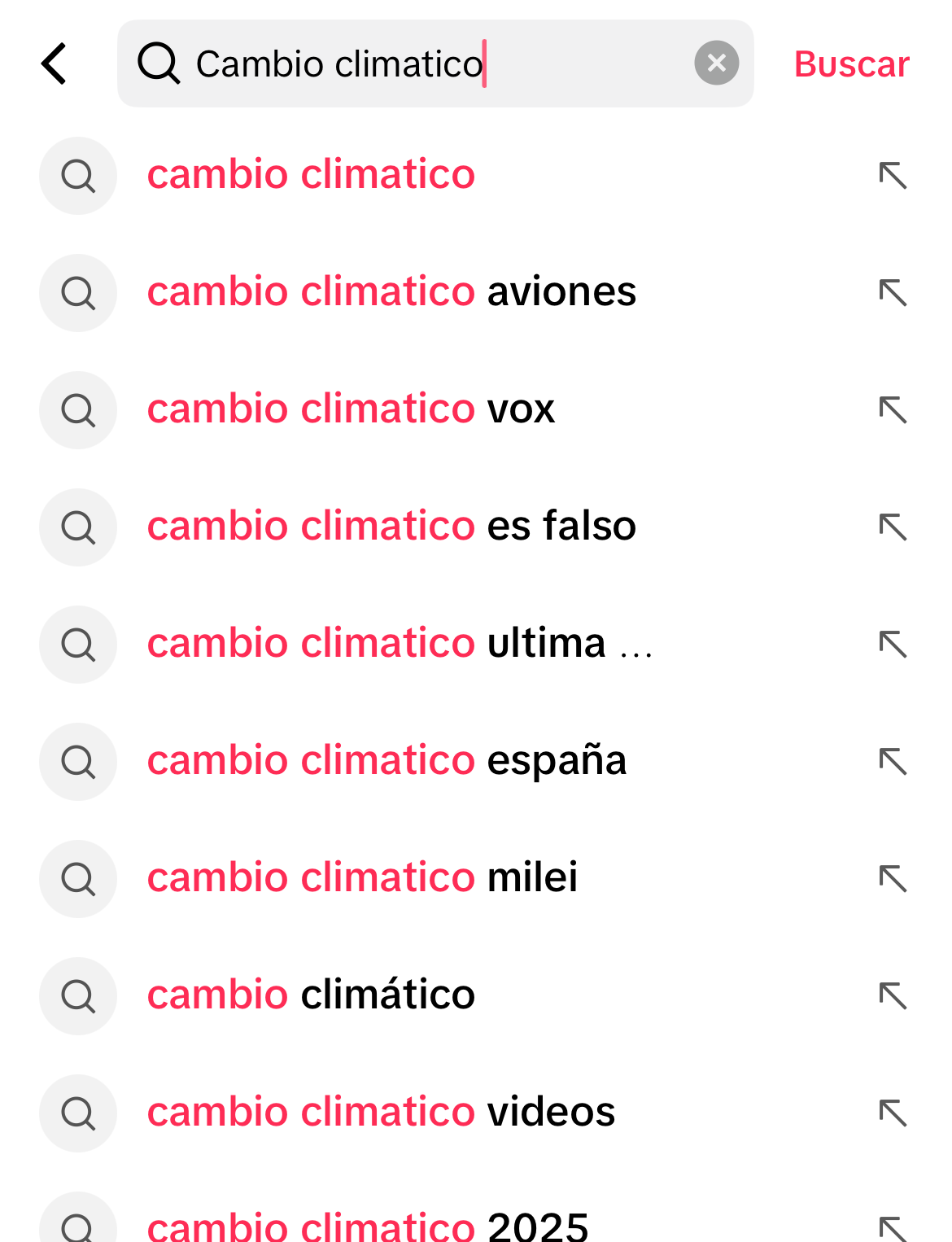
Figure 7: The search result for “climate change” with a new account suggests “climate change is a hoax” among the top three options. The previous suggestions include “climate change planes,” which mostly leads to content related to the chemtrails conspiracy theory and “climate change VOX,” referring to the far-right party in Spain.
- White supremacist theories are easily found in Spanish. While terms like “Great Replacement,” “Kalergi Plan,” and “White Genocide” are restricted in English, they remain accessible in Spanish. However, misspelling or altering word order in both English and Spanish allows users to bypass restrictions and find content. For example, searching for “Plan Kalergi” led to the first 20 suggested videos promoting the conspiracy, with no counter or informative content, making it the easiest term to find white supremacist material. Regarding the “Great Replacement,” the first 13 videos countered the theory or were informative, but from the 14th onward, the content supported it.
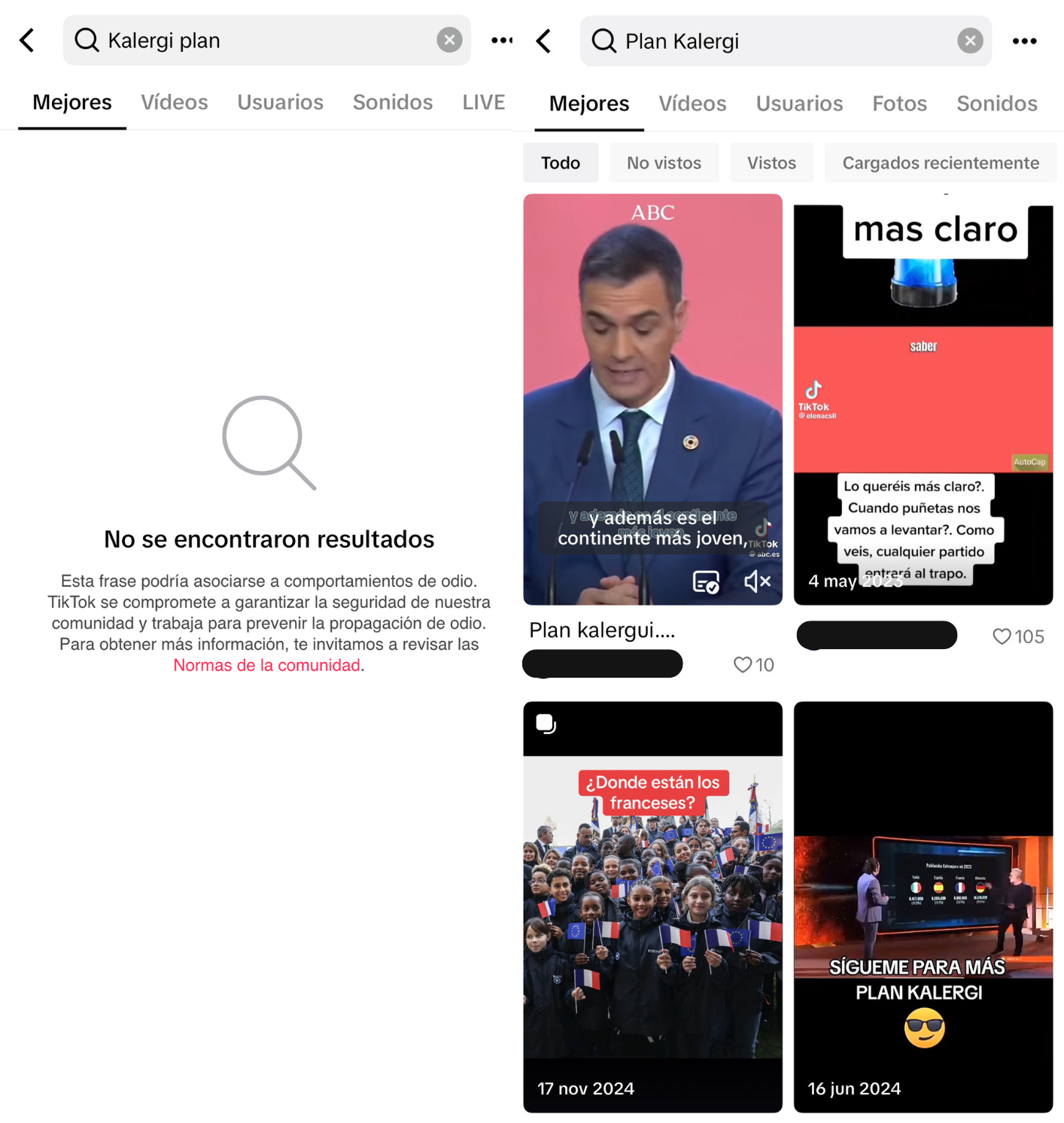
Figure 8: On the left: A search in English for the term “Kalergi Plan” returns no results because it is restricted. On the right: When entering the term in Spanish, the application directly returns content promoting the theory.
- TikTok seems to amplify white supremacist conspiracy theories through echo chambers. When a newly created account with no prior engagement was used to search for terms related to climate change, the 2030 Agenda conspiracy theory, and white supremacist ideologies, the recommendations were exclusively focused on far-right content, including fascist narratives. No alternative perspectives were suggested. This reinforces the risk of radicalisation, as users are exposed solely to content that aligns with their existing beliefs, strengthening their biases and isolating them from diverse viewpoints.
- The 2030 Agenda is dominated by conspiracy rhetoric. Of the first 20 search results, 19 promoted conspiracy theories, linking users to climate denial and white supremacist content.
Conclusion
This analysis has revealed that climate change denialism interacts with white supremacist rhetoric, often operating under the umbrella of conspiracy theories about a secret agenda pushed by ‘the elites.’ Moreover, this content easily intersects with other forms of hate, targeting not only migrants but also the LGBTIQ communities and feminists.
This research highlights broader systemic issues that TikTok continues to struggle with, particularly in multilingual moderation. There is a need for more robust strategies that go beyond English, ensuring effective moderation in other languages, including minority ones. A major concern is the under-moderation of harmful content related to white supremacist ideologies and climate change denial. Addressing this requires both strengthening human and automated moderation systems and improving the enforcement of TikTok’s own guidelines. Additionally, it is crucial to prevent TikTok’s algorithms from amplifying or promoting such content through automated recommendations and to tackle the issue of misspellings, which allow users to evade moderation.
A fundamental reevaluation of how conspiracy theories are moderated on the platform is essential. This should include conducting risk assessments to understand their potential to radicalise users and collaborating with institutions dedicated to researching extremism. Lastly, tackling disinformation about the 2030 Agenda is crucial, as it has become a focal point for conspiracy theories, especially in the Spanish content.
Urszula Mrozowska has worked as an online safety analyst, specialising in hate speech, extremism, and disinformation, including climate-related and electoral disinformation, on social media. She has worked in the tech industry, focusing on investigating these issues across Spain, Latin America, and Poland. She holds a Bachelor’s in Linguistics from the University of Barcelona and a Master’s in Latin American Studies, completed between the University of Warsaw and the Andean University Simón Bolívar of Ecuador. Previously, she conducted research in Business and Human Rights, investigating corporate human rights violations and their social and environmental impacts.
